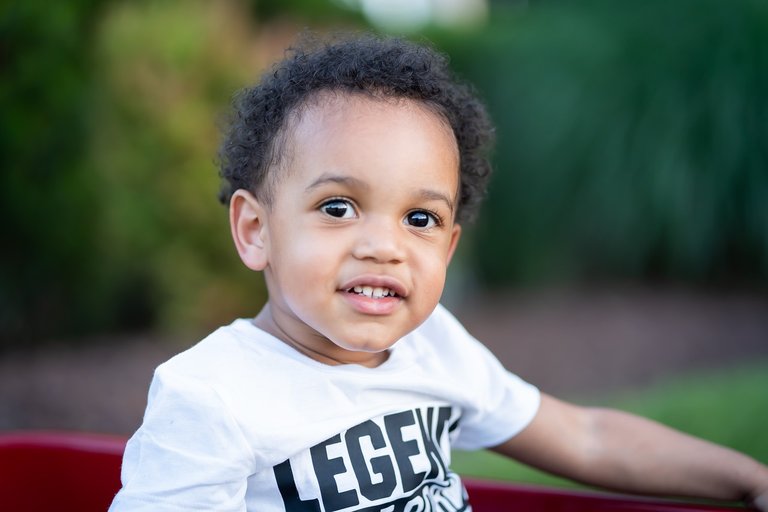Before I even saw your face, I knew exactly which wrapper I’d pick out. It was crimson Ankara, decorated with golden flowers outlined in black. I had others, of course, what Yoruba woman doesn’t? But that one was meant for you.
When I first pressed you to my back and wrapped you in that fabric, adjusting you so you'd be comfortable while your grandmother tied it off, I fought to hold back the tears. After months of hospital visits and late-night feedings, you were finally big enough to be backed. I tried to imagine what it felt like for you, and what it had felt like for me, for my mother, and for so many others before us. I moved cautiously around the house, worried that each step might dislodge you and make you cry.
Soon, I was doing everything while you were on my back. I’d pound yam, sweep the floors, even dance with you. I loved feeling your little legs kick in excitement, but nothing compared to hearing your giggles. You were always more content on my back, drifting into sleep the moment you were tied to me. And when you woke, it was always with a cry of relief, knowing I was right there.
The first time I left the house while backing you, you were nearly a year old. It was out of necessity. Your dad had taken the car to work, and I had no way of carrying both you and the shopping home. So, I stepped out of our quiet refuge into the sleepy English town we called home.
The stares came first, then the questions.
“Can she breathe in that?” an elderly woman asked, concern etched on her face.
“Why don’t you buy a pram?” a man asked with a patronizing smile.
Most amusingly, a little girl pointed and asked, “Mummy, why is she squeezing her baby?”
After that, I only backed you when there was no other choice. Sometimes we were ignored, but often we were harassed. Even when I invited friends over to fuss over you and catch up on gossip, their eyes widened when I tied you to my back. It was only with cousins, aunties, and family friends that I felt normal. We’d help each other secure our babies, then stand shoulder to shoulder as the little ones babbled to one another. It never got easier to say goodbye to them and return to a world where we were different.
Soon enough, too soon for my liking, you were big enough to toddle beside me. You rejected the wrapper in favor of zooming through the park on your balance bike, pausing only to make sure I hadn’t abandoned you. I’d hoped by then to have another baby on my back, a playmate for you. But God had not blessed us with one, and never would. I watched as the wrappers gathered dust, except for your beloved red and yellow one. You’d drape it around yourself before falling asleep, or tie your baby dolls to your back with it. As you grew taller, the wrapper evolved, too. It became a canopy for your forts with school friends, a fashion show outfit, or something to practice your Cubs knots on. I half expected it to continue changing, to grow with you as its colors began to fade. But one day, you tossed it in the corner of your room and never looked at it again.
I let it lie there for a while, waiting for you to pick it up again. After a few weeks, while you were away at a scout camp, I retrieved it. I crawled into bed, wrapping myself in it just like you used to. It still smelled like both of us. When your dad came home from work, we both slept under it, instead of our duvet, clinging to a piece of younger you.
I watched as the chubbiness faded from your cheeks and waved you off to secondary school. I kept a plastered smile until I could retreat to my car and weep in private. As I wiped my tears with my sleeve, I looked up and saw something unexpected. A woman with auburn hair hurried past with her Year Seven child following behind. On her back, secured in a brown sling, was a bright-eyed baby.
I mentally chastised myself for being so surprised. Of course, we weren’t the only ones to back our babies. I had read about many cultures that did the same. But seeing it here, with no one reacting to it, took me by surprise. I pulled out of my parking spot and drove home, unable to stop the tears.
Before long, baby-wearing became the norm. People wore their babies in slings, backpacks, even contraptions that could hold toddlers. Some of the friends who had once looked so incredulously at me now wore their own children, raving about how it promoted secure attachment. No one batted an eye. Even men wore their babies now. It was fashionable. When I did it, it was foreign and primitive.
You noticed too. “Mummy, everyone’s backing their babies now!” you exclaimed, your voice tinged with bitter surprise. You seemed to remember the judgment we faced. How? Had I ever complained to you about it? Or had you simply understood how these things went?
I swallowed my resentment and answered, “Yes, they are. Isn’t it wonderful?”
